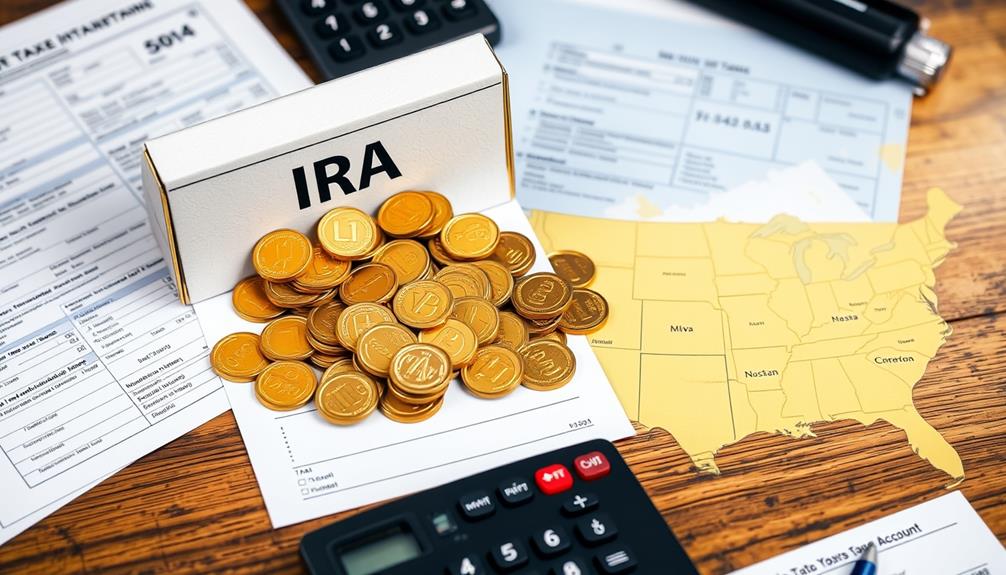When you withdraw from your IRA in Maine, you will be subject to state income tax rates ranging from 5.8% to 7.15%. This tax can have a significant impact on your retirement planning. Fortunately, Social Security benefits are not taxed at the state level, providing some relief. If you receive pension income exceeding $10,000, you may also qualify for a tax exemption. Understanding these implications is crucial for making well-informed financial decisions. Additionally, being aware of early withdrawal penalties and required minimum distributions can help you avoid unnecessary expenses. There is a lot more to learn about maximizing your retirement savings and tax advantages.
Key Takeaways
- IRA withdrawals in Maine are subject to state income tax rates ranging from 5.8% to 7.15%, impacting retirement planning.
- Social Security benefits are exempt from Maine state income tax, providing additional financial relief for retirees.
- Pension income over $10,000 qualifies for tax exemptions, significantly reducing taxable retirement income in Maine.
- Early withdrawals from IRAs before age 59½ incur a 10% penalty, which must be reported on federal tax forms.
- Qualified Charitable Distributions (QCDs) allow individuals aged 70½ or older to donate from their IRAs without incurring taxable income.
Overview of Maine Tax Policies

Maine's tax policies can greatly impact your retirement planning, especially when it comes to IRA withdrawals. The state operates a progressive income tax system, which means your retirement income, including IRA distributions, could be taxed at rates ranging from 5.8% to 7.15%. This system can markedly affect your financial strategy if you rely heavily on withdrawals from retirement accounts.
Fortunately, Maine offers some advantages for retirees. Social Security benefits are exempt from state income tax, providing a financial break for those relying on this income. Additionally, if you're receiving pension income, you'll find that amounts over $10,000 qualify for a tax exemption, which can ease your overall tax burden.
However, keep in mind that retirement income from 401(k)s and IRAs is still subject to Maine taxes. There are also potential tax deductions available based on your income level, so it's wise to explore those options.
Income Tax Rates for Retirees

When planning your retirement in Maine, understanding the state income tax rates that apply to retirees is key. Maine imposes personal income tax rates ranging from 5.8% to 7.15%, which can greatly impact your overall retirement income.
Unlike Social Security benefits, which are tax-exempt, retirement income from IRAs, 401(k)s, and pensions is considered taxable under state laws.
For 2024, if your pension income exceeds $10,000, you can benefit from a tax exemption, easing some of the burdens associated with state taxes. Additionally, the pension deduction allows you to deduct up to $35,000 in 2023 and $45,864 in 2024 from your taxable income, providing further relief for retirees with qualifying retirement income.
Effective tax planning is essential to help you maximize allowable deductions and minimize your tax liabilities on retirement distributions.
Tax Treatment of Social Security

Social Security benefits are a key component of many retirees' financial plans, and in Maine, they enjoy a significant advantage: they're exempt from state income tax. This means that you can keep more of your retirement income, enhancing your financial stability during your golden years.
While federal tax implications may still apply, Maine's policy offers favorable tax treatment compared to states that tax Social Security income.
This exemption not only supports your financial planning but also makes Maine an attractive retirement destination. Here are a few key points to reflect upon:
- Maximized Income: Without state income tax on Social Security benefits, you can potentially increase your taxable income from other sources.
- Competitive Edge: Maine's tax structure is more favorable than neighboring states with higher income tax rates on retirement income.
- Long-Term Financial Security: The absence of state taxes allows for better budgeting and planning for future expenses.
Impact of Property Taxes

For retirees in Maine, property taxes can greatly impact financial planning, especially when withdrawing funds from IRAs. With an effective property tax rate of approximately 1.28%, which exceeds the national median, these taxes can markedly reduce your disposable income.
On average, you might find yourself paying around $2,722 annually in property taxes, which can strain your budget after IRA withdrawals.
The median home value in Maine is $212,100, less than the national median, but this doesn't necessarily mean lower overall tax burdens. However, Maine does offer a homestead exemption for permanent residents, which can help reduce your property tax liability and ease the financial pressure during retirement.
Additionally, there are property tax assistance programs specifically designed for seniors in Maine, providing further relief. These programs can be pivotal in managing the financial impact of property taxes on your retirement income.
As you plan your retirement, it's vital to factor in these property tax implications alongside your IRA withdrawals to guarantee you maintain a comfortable standard of living.
Retirement Income Tax Exemptions

When planning your retirement income in Maine, it's essential to understand the tax exemptions available to you.
You can benefit from pension income deductions over $10,000, and Social Security benefits aren't taxed at all.
Knowing these exemptions can help you manage your tax liabilities effectively.
Exemption Limits for Pensions
Understanding the exemption limits for pensions is crucial for retirees in Maine looking to minimize their tax burden. The state offers significant pension tax exemptions that can substantially lower your taxable retirement income. For 2023, you can deduct up to $35,000 of your pension income, which will increase to $45,864 in 2024.
This means if your pension distributions exceed $10,000, you'll benefit from this tax exemption, easing your overall state taxes.
Here are a few key points to reflect on:
- Pension income over $10,000 is eligible for a tax exemption, helping reduce your taxable amount.
- Maine's progressive income tax rates for retirement income range from 5.8% to 7.15%, so understanding your bracket is essential.
- Social Security benefits are entirely exempt from state income tax, further relieving your tax burden.
As you navigate retirement planning in Maine, keep in mind how these pension exemption limits can impact your financial strategy. Properly accounting for these exemptions can help you enjoy a more comfortable retirement while minimizing state taxes on your retirement income.
Social Security Exemption Status
Maine's approach to Social Security exemption offers retirees a significant financial advantage, ensuring that this crucial income source remains untaxed at the state level. This exemption not only boosts your overall retirement income but also makes Maine an attractive destination for retirees compared to states that tax Social Security benefits.
However, it is important to understand how this aligns with Maine's broader tax landscape. While your Social Security income won't be taxed, other forms of retirement income, such as pensions and IRA withdrawals, are subject to state income tax rates of up to 7.15%. This distinction highlights the importance of strategic tax planning for your retirement finances.
Here's a quick comparison of tax implications on various retirement income sources:
| Retirement Income Source | State Tax Status in Maine |
|---|---|
| Social Security | Exempt |
| Pensions | Taxed (up to 7.15%) |
| IRA Withdrawals | Taxed (up to 7.15%) |
| 401(k) Distributions | Taxed (up to 7.15%) |
Early Withdrawal Penalties

Early withdrawals from your IRA can lead to considerable financial penalties, especially if you take them before reaching age 59½. If you make early distributions from qualified retirement accounts like a traditional IRA, SEP-IRA, or SIMPLE-IRA, you may face an additional 10% tax on the amount you withdraw. For SIMPLE-IRAs, this penalty jumps to 25% if you take withdrawals within the first two years of participation.
When considering early withdrawals, keep these points in mind:
- No exceptions apply: Hardship cases won't waive the 10% additional tax on early distributions.
- Report your withdrawals: You'll need to report these distributions on Form 1040, regardless of your age or account type.
- Additional tax reporting: Form 5329 may be necessary to document any additional taxes due on your early distributions.
These penalties can considerably impact your tax retirement income and overall financial strategy. Understanding these rules helps you make informed decisions about your taxable income and avoid costly mistakes.
Always consult a tax professional if you're unsure about your specific situation.
Required Minimum Distributions

Required Minimum Distributions (RMDs) are an essential aspect of managing your IRA once you reach age 72. If you were born before July 1, 1949, you might have had to start RMDs at 70½. These distributions are calculated by dividing your account balance by the applicable distribution period from IRS life expectancy tables, impacting your retirement income and tax return.
Here's a quick overview of RMD rules for various accounts:
| Account Type | RMD Requirement | Notes |
|---|---|---|
| Traditional IRA | Yes | Begins at age 72 |
| Roth IRA | No | No RMDs during owner's lifetime |
| SEP-IRA | Yes | Required regardless of employment status |
| SIMPLE IRA | Yes | Required regardless of employment status |
Qualified Charitable Distributions

Once you've navigated the complexities of Required Minimum Distributions (RMDs), you might find Qualified Charitable Distributions (QCDs) to be a valuable option.
If you're 70½ or older, QCDs allow you to transfer up to $100,000 directly from your IRA to qualified charities, all while minimizing your tax liability. This strategy not only helps you support charitable causes but also reduces your adjusted gross income (AGI), which can affect taxes on retirement income and even tax Social Security benefits.
Here are some key benefits of utilizing QCDs:
- Tax-free transfers: The amount you donate through a QCD isn't counted as taxable income, effectively making it tax-free.
- RMD satisfaction: You can use QCDs to fulfill your RMD requirements, making them a strategic part of retirement savings planning.
- Simplified reporting: The full QCD is reported on Form 1099-R, with zero listed on Form 1040, simplifying your tax filing.
Comparative Tax Analysis With Other States

When considering retirement income strategies, it's essential to compare state tax implications on IRA withdrawals. In Maine, you'll face state income tax rates on these withdrawals that range from 5.8% to 7.15%.
While this is competitive compared to some neighboring states, it's significant to recognize that states like Florida and Texas have no state income tax, making them more tax-friendly options for retirees.
Maine doesn't offer specific exemptions for IRA withdrawals, unlike Alabama, which exempts the first $6,000 of retirement distributions for seniors.
However, Maine does provide pension income deductions, allowing for a tax exemption on pension income over $10,000. This can be beneficial compared to many states with stricter tax policies on retirement income.
Another advantage for Maine residents is the treatment of Social Security benefits, which are exempt from state income tax.
This contrasts with states like Connecticut, where these benefits are taxed above certain income thresholds.
Frequently Asked Questions
Does the State of Maine Tax IRA Distributions?
Yes, Maine taxes IRA distributions. You'll need to report them on your state tax return, as they're fully taxable. Planning ahead can help you minimize your overall tax liability during retirement.
Do You Pay State Income Tax on IRA Withdrawals?
You might think IRA withdrawals are tax-free, but in many states, including Maine, they aren't. You'll pay state income tax on those distributions, so it's smart to plan for the potential tax hit.
What States Have Mandatory State Tax Withholding on IRA Distributions?
Many states, like California and New York, require mandatory state tax withholding on IRA distributions. Each state's rate varies based on income, so it's essential to check your specific state's regulations before withdrawing.
Do I Have to Pay Taxes When I Withdraw From My Traditional Ira?
Yes, you've got to pay taxes when you withdraw from your traditional IRA. The amount you owe depends on your total income and tax bracket, so it's smart to consult a tax professional for guidance.
Conclusion
Steering through Maine's tax implications for IRA withdrawals can feel like sailing through foggy waters. Just as a seasoned captain relies on a compass to find clear paths, understanding these tax policies helps you chart your financial course. Remember, while Maine's tax rates may seem intimidating, the potential for exemptions and deductions can lighten your load. So, keep your navigational tools handy—planning ahead can steer you toward smoother retirement seas.
Helen brings a wealth of experience in investment strategy and a deep passion for helping individuals achieve their retirement goals. With a keen understanding of market dynamics, Helen has been instrumental in shaping the vision and direction of Gold IRA Markets. She specializes in creating innovative solutions that align with our clients’ long-term investment objectives.










